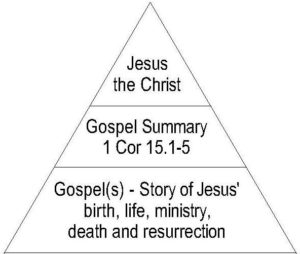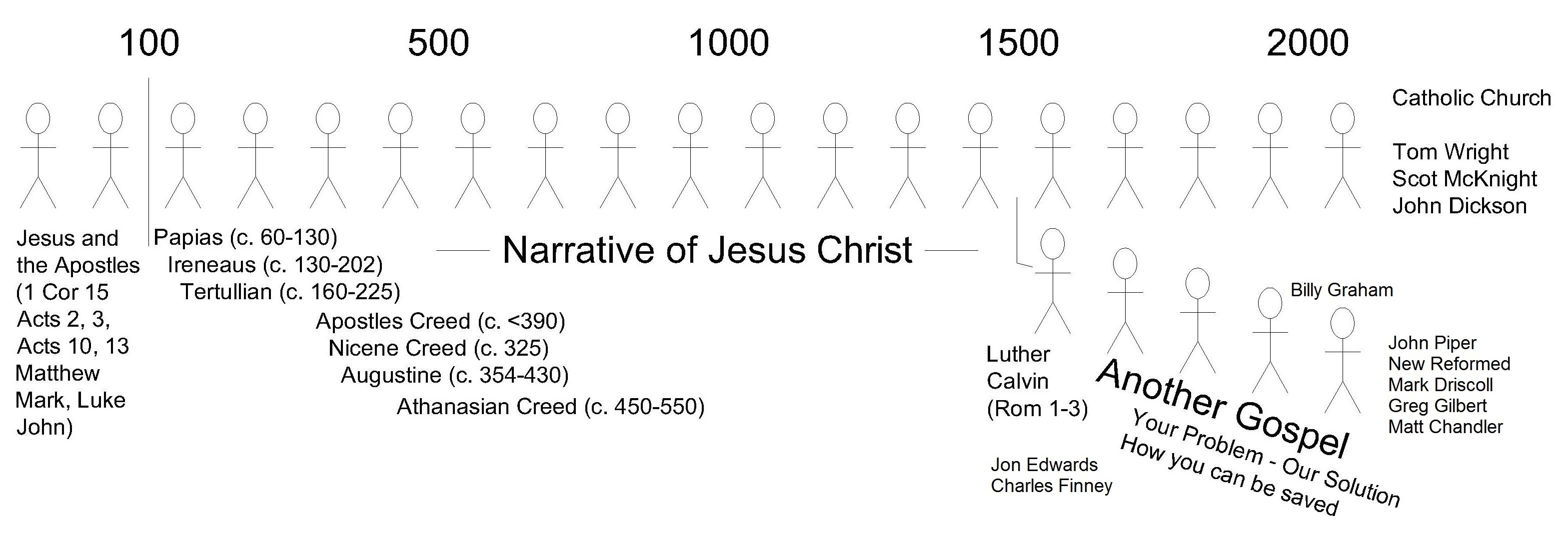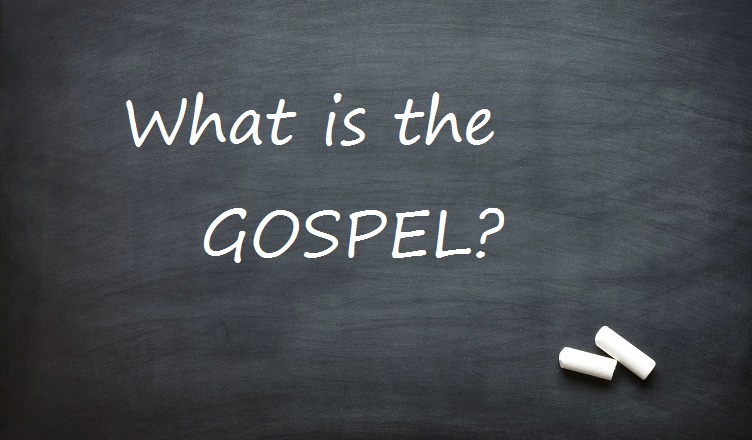 ‘Soter’ is the root Greek noun for salvation. ‘Christos’ is the root Greek noun for Christ. God’s people are called ‘Christians’ because they proclaim Christ. ‘Soterians’ is an expression coined by Scot McKnight in his book the King Jesus Gospel, so named because many evangelicals believe the gospel (little ‘g’) is primarily about personal salvation. What is the ‘soterian gospel’ and how does differ from the Gospel (big ‘G’) the Apostles preached?
‘Soter’ is the root Greek noun for salvation. ‘Christos’ is the root Greek noun for Christ. God’s people are called ‘Christians’ because they proclaim Christ. ‘Soterians’ is an expression coined by Scot McKnight in his book the King Jesus Gospel, so named because many evangelicals believe the gospel (little ‘g’) is primarily about personal salvation. What is the ‘soterian gospel’ and how does differ from the Gospel (big ‘G’) the Apostles preached?
The Soterian gospel
 Foundational to the soterian gospel is a description of the audiences problem with sin and then the solution to their problem found in Christ’s atoning death on the cross. The key presuppositions of the soterian gospel revolve around perfectionism, works-righteousness and sin.
Foundational to the soterian gospel is a description of the audiences problem with sin and then the solution to their problem found in Christ’s atoning death on the cross. The key presuppositions of the soterian gospel revolve around perfectionism, works-righteousness and sin.
Perfectionism. It is assumed to be found right with God in judgment, a person needs to have perfect obedience in all God’s commands and having never sinned in deed, word or thought. Being generally good is not good enough. Being 99.999999% good is not good enough. Absolute perfection of the kind only God maintains is required.
Works-Righteousness. It is assumed everyone is trying to earn their way into favour with God by doing good and right things. To be good enough. When people seek to do the right thing, its not so much about obeying God’s commands and thus seeking to avoid omissional sin. Rather doing the right thing is seen as an attempt to earn right standing with God. Thus obligating God to save them.
 Sin. With God’s supposed perfect standard in mind and works-righteousness of the audience, the soterian gospel has its primary focus on the listeners sin. Aiming at getting its audience to identify as sinners. It attempts to destroy any notion good works or right action curry favour or earn right standing before God because it is assumed people need to be sinless and perfect to be viewed by God this way.
Sin. With God’s supposed perfect standard in mind and works-righteousness of the audience, the soterian gospel has its primary focus on the listeners sin. Aiming at getting its audience to identify as sinners. It attempts to destroy any notion good works or right action curry favour or earn right standing before God because it is assumed people need to be sinless and perfect to be viewed by God this way.
The soterian gospel works to convict its listeners with their sin and guilt before God and their inability to earn God’s favour by good works in order that they may experience liminality and fear of God’s wrath. Liminality is the anxious feeling of not knowing where one stands before God and fearing his judgment.
This is the problem which the soterian gospel aims to highlight in the minds of its listeners in order for them to desire a solution.
 Atonement. The solution to this problem is presented in the perfect obedience of Christ and his atoning death. The key emphasis of the soterian gospels solution concern atonement and forgiveness for sin through Christ’s substitutionary death. (Christ’s resurrection is generally regarded as optional, because only the cross atones for sin.)
Atonement. The solution to this problem is presented in the perfect obedience of Christ and his atoning death. The key emphasis of the soterian gospels solution concern atonement and forgiveness for sin through Christ’s substitutionary death. (Christ’s resurrection is generally regarded as optional, because only the cross atones for sin.)
With their sin and Christ’s atoning death firmly in mind the listeners are urged to trust in Christ’s death for forgiveness and repent. The benefits of Christ’s sin atoning death are appropriated by faith (pistis). Faith thus is more akin to trust in his death for forgiveness, rather than any other meaning of pistis which has broad semantic range.
The soterian gospel is easily defined. It basically runs with these four points:
- God: Holy, Just and Angry
- Man: Sinful, under God’s wrath
- Jesus: Perfect Saviour
- Response: Believe (repent)
The power of the Soterian gospel
On the Audience
 The primary subject of the soterian gospel is the audience. This fits in nicely to the Western worlds assumption that, ‘It is all about me’. The primary topic is the audiences’ problem of sin.
The primary subject of the soterian gospel is the audience. This fits in nicely to the Western worlds assumption that, ‘It is all about me’. The primary topic is the audiences’ problem of sin.
The soterian gospel message is not primarily about God or Jesus, it’s about convicting its audience with sin and its consequences. Sin and punishment are the primary focus, receive the most attention and are the center of the soterian gospel.
The driving power of the soterian gospel is the audiences guilt and fear of punishment over their sin and their inability to do anything about it.
Luther captures this emphasis of the soterian gospel well;
The first duty of a preacher of the gospel is, through his revealing of the law and of sin, to rebuke and to turn into sin everything in life that does not have the Spirit and faith in Christ as its base. Thereby he will lead people to a recognition of their miserable condition, and thus they will become humble and yearn for help. …
Next St. Paul teaches the right way to be virtuous and to be saved; he says that they are all sinners, unable to glory in God. They must, however, be justified through faith in Christ, who has merited this for us by his blood and has become for us a mercy seat in the presence of God, who forgives us all our previous sins.” (Luther, Preface to the Letter of St. Paul to the Romans)
Because the primary focus of the soterian gospel is on the audiences sin and punishment, it is abstract, individualised and impersonal. God is primarily perceived as a judge, distant and angry. Consequently any references to God’s love and forgiveness are undermined by the constant feeling of impending judgment.
The person holding a sword above your head commanding you to take up their faith or die rarely comes across as ‘loving’.
On the Preacher
 Initially most preachers of the gospel are reluctant to judge others, accuse them of sin and condemn them. This is because normally people want to get along with others and maintain friendly relations.
Initially most preachers of the gospel are reluctant to judge others, accuse them of sin and condemn them. This is because normally people want to get along with others and maintain friendly relations.
But through the constant practice of judging others, referring to their sin and receiving some negative responses, any initial discomfort will no longer be experienced. Preachers become desensitized to the discomfort and reluctance to make others feel this way. They might even begin to enjoy this part of the process.
Pointing out people’s sin inevitably puffs the preacher up in pride as they put people down and humble them. That’s what criticism does, when an accuser puts a person down, they inadvertently get raised up respective to them. Even if the preacher includes himself in the judgment, this will still happen.
I believe preaching the soterian gospel will inevitably produce arrogance and sadism with some of its preachers unless this is specifically addressed.
Soterian gospel in Church History
 If we go back to the time of the apostles I think the soterian gospel (if it hypothetically did exist at that time) would have failed outright with Jewish audiences.
If we go back to the time of the apostles I think the soterian gospel (if it hypothetically did exist at that time) would have failed outright with Jewish audiences.
Jews of that time had access to the temple sacrificial system. Any focus on their sin would not necessarily lead them to Christ and his atoning death. Rather it would further encourage them to offer sacrifices for their sin at the temple as specified in the law of Moses. Thus the message would get bogged down in whether other systems of atonement are valid or not.
The soterian gospel will generally fail where the audience believes in repentance and other forms of atonement for sin.
In my research I have found no evidence that Christians believed the soterian gospel was the gospel for up to one thousand five hundred years. There was a consensus of opinion on what the gospel was and the soterian gospel was not it. This really needs to be accounted for with its proponents.
The upshot of this is that the soterian gospel does not make historical sense.
 The soterian gospel probably had its genesis during the reformation when the attention given to salvation began to go beyond that given to Jesus. Its plausible what we know as the soterian gospel was the reformers response to the Roman Catholic doctrine that grace inspired good works are instrumental and necessary for future salvation. The reformed interpretation of justification by faith sought to counter this doctrine. Which is why a reformed interpretation of Romans 1-4 is assumed by many to be the ‘gospel’.
The soterian gospel probably had its genesis during the reformation when the attention given to salvation began to go beyond that given to Jesus. Its plausible what we know as the soterian gospel was the reformers response to the Roman Catholic doctrine that grace inspired good works are instrumental and necessary for future salvation. The reformed interpretation of justification by faith sought to counter this doctrine. Which is why a reformed interpretation of Romans 1-4 is assumed by many to be the ‘gospel’.
The same key presuppositions that were used to counter the Catholic doctrine were eventually formed what we understand as the soterian gospel. I can imagine someone asking, ‘How can I shape our reformed soteriology to form an argument for Protestantism against Catholicism?’ and once found ‘Let’s make this argument our gospel message’.
Are there scriptural examples?
 Biblically the soterian gospel is hard to find in one spot. In practice many string together a series of passages from Romans or through numerous books of the bible to walk people through the four steps. The four steps above can’t be found in a single passage in the scripture.
Biblically the soterian gospel is hard to find in one spot. In practice many string together a series of passages from Romans or through numerous books of the bible to walk people through the four steps. The four steps above can’t be found in a single passage in the scripture.
You might have a soterian gospel if;
- The message ignores the Old Testament which predicts key elements in the gospel,
- The message is primarily about the audience and their relation to God,
- The scriptures appealed too jump around the whole bible,
- The problem of sin and judgment is given more time and emphasis than Jesus,
- The message reaches its climax with how God will deal with your sin (hell or atonement),
- The message speaks of Jesus as primarily saviour and does not declare him the Christ, Lord or King.
- The faith called for is primarily trust, rather than allegiance to Jesus as King.
The Apostolic Gospel
 The Apostles did not preach a gospel which moved from the problem of sin to the solution of Christ’s death on the cross. Their primarily emphasis was on Jesus and him being the risen Christ.
The Apostles did not preach a gospel which moved from the problem of sin to the solution of Christ’s death on the cross. Their primarily emphasis was on Jesus and him being the risen Christ.
Foundational to the Apostolic Gospel message is Jesus. His words, deeds, the declaration he is the Christ, Lord of all and the call to allegiance.
By way of comparison with the soterian gospel, the key elements of the Apostolic Gospel are Scripture, Narrative and Christology;
Scripture. The Apostolic Gospel is framed by the Old Testament scriptures. Its historical in nature. More broadly it includes God’s creation, the Fall, the story of Israel and the exile. More specifically the scriptures which predict and promise the coming of the Christ, aspects of his life and in particular his suffering, atoning death and resurrection from the dead. So the Apostolic Gospel commonly refers to the Old Testament and may well use it as an introduction to the gospel narrative.
Narrative. The Apostolic Gospel narrates the story of Jesus – his birth, life, ministry, sufferings, death, burial, resurrection, witness, ascension and future return to judge. The primary focus of the Apostolic Gospel is about Jesus, his words and deeds. The Apostolic Gospel gives primary attention to Jesus.
 Christology. The Apostolic Gospel proves and declares Jesus to be the promised Christ from the narrative itself and the Old Testament scriptures. The Gospel will declare Jesus Lord, King and therefore Judge of all creation.
Christology. The Apostolic Gospel proves and declares Jesus to be the promised Christ from the narrative itself and the Old Testament scriptures. The Gospel will declare Jesus Lord, King and therefore Judge of all creation.
The Gospel calls people to turn to God and respond in faith (pistis). The faith called for is primarily belief that Jesus is the risen Christ and allegiance to him as King. The Gospel the apostles preached called people to be baptised into Christ’s name.
Soteriology is subordinated to Christology. Forgiveness of sins, eternal life and salvation are the result of recognising Jesus’ authority as the Christ. As King, Jesus has authority to forgive and give eternal life. Forgiveness is in his name and receiving eternal life and salvation are predicated on acknowledging Jesus as Lord.
The Power of the Apostolic Gospel
Whereas the soterian gospel primarily emphasises the audiences sin and guilt before God. The primary focus of the Apostolic Gospel is on the words and deeds of Jesus Christ. Jesus is given the most attention in the Apostolic Gospel.
It follows that when the Apostolic Gospel is preached the audience is getting to know Jesus in his varied contexts. They learn about significant events in his life, his miraculous birth, his ministry, his suffering death and resurrection. They learn about Jesus’ authority over creation, his authority to forgive, his authority over the law of Moses. They are called to follow him, to repent of their sin and believe in him as many others were in the story. They learn about the way he wants his followers to live.
The power of the Apostolic Gospel is Jesus himself because He is present when He is preached. The gospel facilitates a divine encounter with Him.
Jesus is most likely to reveal himself when people are telling his story. When Jesus is preached and God makes himself known through the power of the Spirit, the knowledge he imparts of himself is inherently relational. The grace they feel is primarily relational.
When audiences hear the soterian gospel, the awareness of their own sin and guilt before God are the reason why they come to God and ask his forgiveness. They believe in Jesus because of what he can give them, not necessarily because of who he is. If we had no need of forgiveness, the soterian gospel would not encourage us to follow him.
Audiences hearing the Apostolic Gospel get to know Jesus and his amazing qualities are inherently attractive. Jesus is a natural leader. People want to follow him and come under his rule purely by hearing about what he said and did. We follow him because of who he is, not simply because of what he gives. Even if we had no need of forgiveness we would still follow him.
Apostolic Gospel in Church History
The Apostolic Gospel message has been believed by the church from day dot, and for a couple thousands of years afterward. This becomes immediately apparent in the book of Acts where the Apostles proclaimed Jesus, told the story of his life, death and resurrection in numerous locations.

The early church fathers continued to understand the Gospel this way. The Gospels according to Matthew, Mark, Luke and John were called the Gospel by the early church because they believed they were the Gospel. This can be backed up by numerous early church writings. The early church went so far as to incorporate the Gospel in the Apostles’ and Nicene creeds.
The Apostolic Gospel is inherently more attractive than the soterian gospel because Jesus is. Jesus (not us) is given primary position in the Apostolic Gospel. This is what happened in the early life of the church. The Christian church grew amazingly in the 3rd and 4th centuries reaching approximately 10% of the world’s population in two centuries.
Copyright © Joshua Washington and thescripturesays, 2017. All Rights Reserved.





